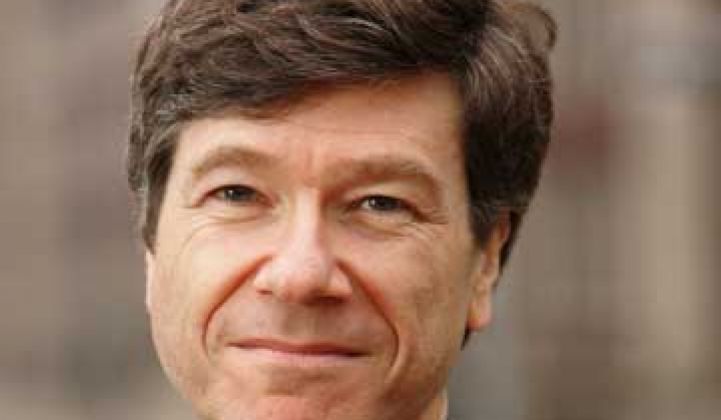Jeffrey Sachs isn’t solely placing blame for the unsustainable direction of the human population at the feet of Rupert Murdoch, but he’s certainly staring in the media mogul’s direction.
At the 17th annual International Sustainable Development Research Conference in New York City, Jeffrey Sachs, Director of The Earth Institute at Columbia University and superstar economist, offered a grim outlook of where the world is now and where it might be headed. “I think it is right to say the window has closed,” he proclaimed. “We are now in a state of anthropogenically induced global crisis.” Fox News and the Wall Street Journal aren't helping the situation.
Sachs was not just referring to the acidification of the oceans or biodiversity loss, but also the almost-annual occurrence of “100-year” weather events, the pressures of real rising food prices and the continued reliance on fossil fuels. What has brought it all on so fast, he said, was the surge in world economic growth, primarily from powerhouses such as China. Although his keynote roamed beyond the need for a change in the energy economies of every nation, the powers working for and against new sources of renewable energy was a center point of his speech.
In case worldwide crisis on every front was not a grim enough prospect, Sachs also contended that we’re in a time of failed institutions. “Our institutional capacity is woefully behind,” he said. He spoke of the silos of sustainability: economic, humanitarian and environmental, which can never be looked at in isolation, yet often are. He pointed to biofuels as one example. While he noted there was good work being done in biomass fuels that don’t compete with food, the reality is that in the near term, nearly all biofuels would be at odds with food crops or habitat. “Of course, the novelty of these challenges is working against us,” he said.
There will be technological breakthroughs -- ARPA-E, the research arm of the Department of Energy has committed more than $41 million for non-biomass, non-petroleum fuel sources -- but there are vested interests more powerful than the government at work, according to Sachs, who said that the politicians are all bought and paid for, anyway. He noted that each election cycle cost $4 billion, a figure that continues to grow with no end in sight. It’s not your corner grocer footing that bill.
“Were it not for Exxon Mobil, Rupert Murdoch, the Koch brothers and their cronies, we would have made a tremendous amount of progress on these issues,” he said. “It’s not that solutions aren’t available -- it’s that they’re being undermined.”
When Greentech Media spoke to Sachs after his panel, we noted that despite the talking heads on Fox News blasting everything from carbon legislation to upgrading rail infrastructure, the parent company News Corporation's global operations have reportedly gone carbon neutral in less than three years. While Murdoch seeks to sway public opinion, he is also investing in a low-carbon future and “growing sustainably.”
Sachs was unmoved by the argument that there are strong enough economic arguments for energy-efficient, low-carbon practices in businesses. In his view, Murdoch’s public campaigns outweigh what his company is doing internally. “Murdoch on the whole has been one of the most irresponsible people in the world on this issue,” he told Greentech Media. “I think his actions have been entirely detrimental and completely unscientific.”
His frustration was not reserved for Murdoch, either. The lack of action within Washington, and the power of lobbies, was also central to his argument. The Democrats are currently looking to cut about $4 billion in cuts to subsidies to big oil companies, but that should not be seen as a win, said Sachs. “I think they’ll get this done,” he said, “but it’s tiny. This would be a modest step, and useful, but we should keep our eye on the bigger things.”
He concedes there are pockets of movement, such as the 33 percent renewable portfolio standard in California. But a clean energy economy will continue to be a fractured picture without global agreement. “I don’t see a solution to 'decarbonize' the energy system in the absence of a full frontal effort from governments around the world,” said Sachs. The solution will take policy, science and ethics all working in coordination.
And can that ever happen, given the lack of commitment from China and the U.S. in the past? “It will come,” Sachs proclaimed. “The question is whether it will come so late that the dangers we are living with now will damage a large part of the world.”



